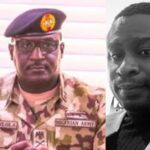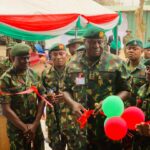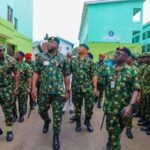By Augustine Ehikioya
With some communities completely deserted in the North East, the Theatre Commander, Joint Task Force, North East Operation HADIN KAI, Major General, Christopher Musa, has given reasons some Internally Displaced Persons (IDPs) cannot immediately return to their war-torn communities.


The delay, according to him, is not because any community or local government is under the control of terrorists.
Safeguard of the IDPs’ lives, he said, is the main reason for their delay in going back home as there are still potential danger in the areas due to mines and explosives left behind by the ousted terrorists.
He spoke in an exclusive interview with Security Watch Africa (SWA) in his office in Maiduguri, Borno State.
The communities, he said, have to be properly cleared before the IDPs can safely return home.
But one of the major obstacles to quickly clearing the communities, he noted, is the issue of bad roads in the North East.
He said “In the North East, for sure, I can tell you that we are winning the war. There is no local government that is being held by them. Some areas where the villagers are not back is because we still need to go and clear those areas of mines and explosives.
“So we have to do that gradually. We are spread everywhere and we are taking it very easy to ensure it is cleared before they return with their children.
“And this takes time because we don’t have good roads. If we have good roads, it will take out 65% of our challenges. Peace is coming in and we are sure we are going to achieve that,” he said.
Giving further assurance on total peace coming to the North East, he said “So far, so good, we are happy the way the operations are on-going. We are sure we will achieve our mandate of restoring total peace in the North East.”
In less than a year, he disclosed that over 51,000 terrorists and their families have surrendered to the Nigerian Armed Forces.


“Now we are having over 51,000 total that have surrendered, and out of which over 11,000 are male. Our duty now here is that we are providing security to ensure those of them that are in, nobody from outside interferes with the process, while the State government manages them within the camps.
He expressed optimism that more terrorists will continue to surrender in the coming weeks.
Giving reasons why they are surrendering, he said “A lot of contributory factors. One, a lot of them have realized that it is foolhardy to continue fighting. You can’t fight any nation, nobody can win it. Two, the death of Shekau brought in so much infighting, Boko Haram elements fighting for power to take the leadership.
“The coming of ISWAP has also brought infighting between ISWAP and Boko Haram elements. ISWAP, because they are getting foreign funding, they felt they could take over the remnant, the foot soldiers of Shekau to their own advantage. But unfortunately, because of ideological differences, it couldn’t work.
“And with the pressure we are putting through our Kinetic and non – Kinetic efforts, life is a lot difficult for them. They are starving, they don’t have logistics and they think and realized that the best thing to do, after doing evil, is to surrender. If they surrender to the professional Army, the Armed forces, we will treat them decently in line with the Human Right Charter and the rules of war.
“If your enemy surrenders, you can’t kill him. So, you take them in, profile them up and sort them out from the combatants and non – combatants. The State Government comes in, takes them in and provide camps for them where we keep them. That’s where we are now,” he added.
Speaking on the next action to take affer surrendering, he said “The next aspect of it is that it is supposed to be the DDRR Programme, where they are supposed to be demobilised and deradicalized and then re-integrated back into the communities.
“That is a governmental approach, not the military. Our part is to make sure they are secured and then provide the conducive environment for the government to come and do their own task. And I think that is what is being sorted out,” he said.
The Theatre Commander also said that the Federal Government has a key role to play towards peace and reconciliation among stakeholders including the surrendered terrorists and victims.
He said “Without the support of the Government, we won’t have gotten to where we are today. Now, what we are looking at is to have a holistic approach because it is beyond the State Government alone handling this.
“The Federal Government needs to come in with all its apparatus to be able to assist and that’s what we are looking forward to, a sort of governmental inter-ministerial approach, where they will sit down and look at it holistically and be able to proffer solution that will work, something towards the Borno model.”
He also urged those concern to investigate and review how countries like Rwanda, Colombia, and South Africa, handled their cases.
“Because what we realized is that different environment presents different challenges. And so, we can take a cue from what happened in Rwanda, Colombia, and South Africa, and then model something that will work for us here.
“The process is ongoing and we are hopeful that it will bring out wonderful model for the system.”
He went on “The approach we suggested to the government was to ensure that all stakeholders to the peace efforts, which involves the victims, so the victims are carried, the communities are carried, the community leaders, the Ulamas, the Bulamas, the Imams, the local government and all the organizations are all part of what is going on.
“So everybody knows and understands that we need to have peace. And people realized that without these people coming out, it will be difficult. So, I know that initial concern and doubt, is it real, is it not real. People are beginning to look at it as the best approach we can go through.
“Our Kinetic effort is on-going, we just came back from the Timbuktu Triangle and we have gone to the Sambisa forest and we have cleared them up. We are entering Mandara mountain. Wherever they are, our operation is going through while the Multi-National Joint Task force is also clearing the fringes coming through Chad, Niger, Cameroon.
“Before now, when we go to attack, they run into these countries and when we leave, they will return. But now it is a holistic approach to ensure that it is done properly. The North-East is really getting peaceful,” he stated.
Despite successes against terrorism in the North East, he said, the military and other security agencies are still facing few skirmishes in the area.
“And what we have also tried to do is to carry members of the communities, to understand that this war is not just for the Armed Forces or for the security agencies, but it is everybody’s war. And we are happy so far, things are looking very positive, peace is gradually returning.
“We still have few skirmishes here and there, remnants of the ISWAP and Boko Haram elements that are still refusing to surrender. We are mopping them, we are conducting Operation Desert Sanity with the members of the Multi-National Joint Task Force, comprising of Chad, Niger and Cameroon, together with our own force,” he said.







